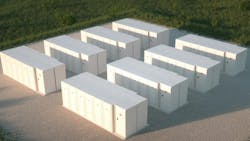Survey Finds Majority of Americans Support Local BESS Projects, While Opposition Highlights Need for Greater Public Awareness
A new national survey commissioned by Firetrace International finds that 71% of Americans are generally supportive of Battery Energy Storage System (BESS) sites in their local communities. The findings are published in the report “Unlocking Public Support for BESS,” which surveyed nearly 4,000 individuals across the United States to assess awareness and attitudes surrounding this technology.
Battery storage is considered a key component in supporting renewable energy integration and grid stability. While most respondents express support for BESS projects, approximately 29% reported opposition — often citing environmental, safety, and health-related concerns.
The report notes that among those who oppose BESS, a majority (52%) indicated they had not encountered any information about such projects. Some respondents cited specific concerns related to fire risks, toxic leaks, or environmental impacts. The survey also found that news coverage of high-profile BESS incidents may influence public perception.
According to the survey, public support for BESS projects increases significantly when potential benefits are clearly communicated. Among respondents, 70% said they would be more comfortable with BESS sites if the projects resulted in lower electricity bills, 68% if they improved reliability of power supply, and 63% if they created local jobs or economic opportunities.
The findings suggest that education and transparent communication regarding the economic and operational benefits of BESS could influence public attitudes, especially in communities considering new installations.
Environmental and safety risks remain prominent concerns among those hesitant to support BESS. 47% of respondents said they would oppose a project if it negatively impacted the local environment, 40% due to concerns about potential toxic leaks, and 38% due to fire or general safety risks.
However, the survey also shows that more than 45% of respondents would be more comfortable with a BESS project if they received clear information about environmental impacts and safety measures.
When asked about specific safety features, two-thirds of respondents (66%) said they would be more supportive of a BESS site if it included fire suppression systems capable of rapidly controlling incidents. Among those who initially opposed BESS, nearly one-third (31%) said the inclusion of fire suppression systems from the start would make them more likely to support a project.
These findings suggest that technical safety measures — paired with transparent communication — could play a significant role in improving public acceptance.
